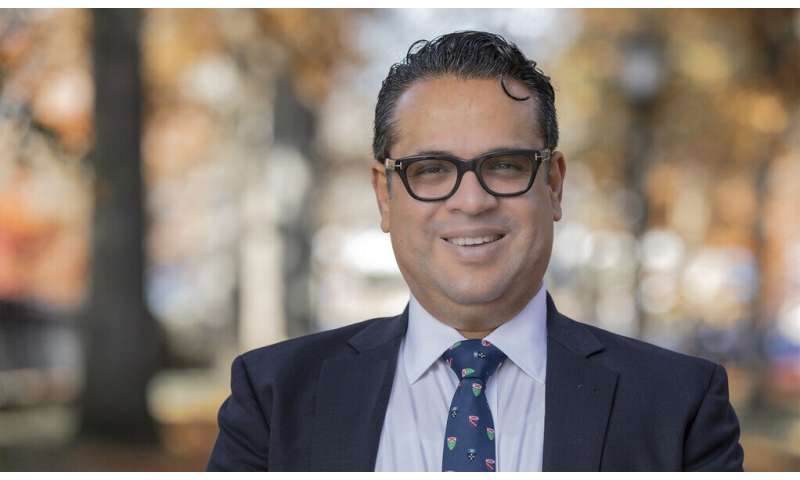#Public buy-in for vaccines essential to stall COVID’s rising tide

“#Public buy-in for vaccines essential to stall COVID’s rising tide”

Yale’s Saad Omer has devoted his career to studying the spread of respiratory diseases like influenza and SARS CoV-2, which causes COVID-19, and how society can increase vaccination rates.
In an interview with YaleNews, Omer, a professor at Yale School of Medicine and director of the Yale Institute for Global Health, sheds light on what we have come to know as the “waves” of COVID-19—how they proceed, why we’re experiencing another one, and what to expect next—as well as how to build public trust in vaccines in development.
Omer is also the Susan Dwight Bliss Professor of Epidemiology of Microbial Diseases at Yale School of Public Health, and an adjunct professor at the Yale School of Nursing.
The following conversation has been condensed and edited.
The rising number of COVID infections in Connecticut and across the country suggests that we have entered at least a second wave. Can you explain?
It is our second wave in Connecticut. For the rest of the country, it is a third wave. It’s a rising tide that has never receded. There was a March-to-May wave, and then the rest of the country had a summer wave; we didn’t in Connecticut.
There are several reasons why we are seeing these waves. One, it’s impossible to shut down state borders. Eventually, you will see substantial importation from other states. Two, most respiratory viruses, including coronaviruses, transmit more efficiently during winter months. They respond to the change in humidity, and there are more people indoors. And third, people start to relax because of the economic imperative.
The waves will end either from immunity due to vaccination or when there are so many waves that so many people become infected. But that is a dangerous prospect—because it means many people are going to be killed. The ideal thing is to stall the spread and get people vaccinated as quickly as possible.
How can we slow down this wave we are currently experiencing?
We can slow it down if we focus on mask wearing, which we have to do as a country. There are only limited things one state can do to contain it. Mask wearing really works when it’s done at a high level. We also have to make sure people don’t congregate, especially where there is a lot of conversation, singing, and/or poor ventilation. We need to invest in better ventilation. On the economic side, giving people economic security de-incentivizes high-risk behaviors. You won’t have to go out if you have something to fall back on.
Why is a rising number of infections particularly worrisome as we enter cold and flu season?
Flu cases in a regular season are a burden on the healthcare system. As a COVID-19 surge happens, it displaces care for other diseases. In Australia, we saw a very low flu season during the outbreak due to COVID-19 prevention efforts. But while that data is reassuring, there is no guarantee that will happen in the U.S., as prevention efforts are not as widely accepted here. To guard against it, we need as high a flu vaccination rate as possible.
There have been promising developments in COVID-19 vaccines. How do you see them affecting the current and future waves?
Unfortunately, the earliest [that] vaccines can start having an impact is early next year. Approval is likely to come in late November or early December, and first doses could go out early next year—and that is optimistic. And we are going to need pretty substantial doses. Non-pharmaceutical interventions have to be the focus for this wave. We need to focus on mortality first and then transmission.
What’s needed to build public trust in the COVID-19 vaccines?
There need to be elite endorsers like Dr. Anthony Fauci [director of the National Institute of Allergy and Infectious Disease]. Bipartisan endorsement is also important. We need to provide online training to thousands of healthcare providers. We need to make sure that science-based policy is followed in terms of approval and regulation. An important cornerstone of building the public trust is doing the right process. And lastly, we need to engage communities and partner with organizations in communities of color who are disproportionately impacted by COVID-19, to share the benefits of vaccines and address their concerns.
Follow the latest news on the coronavirus (COVID-19) outbreak
Citation:
Public buy-in for vaccines essential to stall COVID’s rising tide (2020, November 23)
retrieved 23 November 2020
from https://medicalxpress.com/news/2020-11-buy-in-vaccines-essential-stall-covid.html
This document is subject to copyright. Apart from any fair dealing for the purpose of private study or research, no
part may be reproduced without the written permission. The content is provided for information purposes only.
If you liked the article, do not forget to share it with your friends. Follow us on Google News too, click on the star and choose us from your favorites.
For forums sites go to Forum.BuradaBiliyorum.Com
If you want to read more Like this articles, you can visit our Science category.




